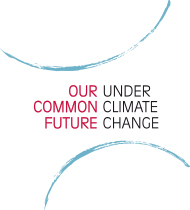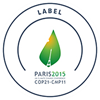The next climate change COP, which aim is to achieve a new global agreement on post-2020 emissions reductions keeping global warming below 2�C, will take place in Paris. As France is worldwide renowned for its fine wines it could be particularly relevant to raise public awareness on the impacts of climate change on viticulture. Beyond being an economic asset wine production is also a fundamental piece of its culture and its identity. Climate change would not only affect the economy of the country but can lead some territories to lose important elements of their culture.
To contribute to the current global reflexion about climate change, we decided to organize an event open to the general public and linked with the scientific conference �Our common future under climate change�.� Consistently, we will adopt a similar approach by gathering interdisciplinary knowledge on viticulture and trying to define the key impacts of climate change on this activity. As students in the Master�s degree �Economics of environment, energy and sustainable development�, one of our main study topics is the impacts of climate change on agriculture. We also focus on public policies to mitigate and to adapt to climate change. We believe that economics is a tool to facilitate communication between stakeholders and encourage transversal and global solutions to climate change.
We chose to organize an event on wine and viticulture for the following reasons. Climate is particularly essential for wine as it influences in particular its taste and the period of grapes harvesting.� As some French areas, such as Bordeaux, Languedoc, Champagne or Bourgogne are famous for the quality of their wine, climate change consequences and mitigation are of particular concern for winemakers and for public authorities.
With a playful, original and effective approach, we aim to raise public awareness on the concrete effects of climate change on their daily life . With the topic of wine and viticulture, we will be able to present a wide range of its impacts:��
- At a local scale: how climate change may reshuffle the localisation of grape varieties. Some regions will see their climate evolve in various ways: which region would beneficiate from climate change, and which would be affected negatively? ;
- On our life habits: how will the taste of the wines we are used to drink change ? Heat and drought impact grape�s growth and influence the taste. Therefore, winemakers will have to adapt their techniques and tools in order to tackle this change. At the same time, the consumers will also be impacted by this evolution therefore there is a need for the wine industry to anticipate their reactions. ;
- On a macro scale: how it may affect the French economy ? Wine is the second export sector, weighting 7.6 billion � and employing 558 000 directly and indirectly in France. Given this, how can the government adapt its politics? What are the risks for the economy? Benefiting from renewed climatic conditions, which countries will be able to develop a wine production in Europe ?
To address these entangled aspects, we invited three experts from various backgrounds. Herv� Qu�nol will speak about the scientific dimension of Climate Change and Wine. He is a research supervisor at CNRS where he manages the LETG - Rennes - COSTEL laboratory (Climate and land cover analyses using remote sensing). Thanks to his research, he has been appointed by the French Ministry of Agriculture as scientific expert for the �Viticulture and climate change� committee of the International Organization of Vine and Wine. Jo�l Rochard will have a political approach with its experience in mitigation that concerns winemakers and also public authorities; he created the French Institute of Wine.� Finally, Marie-Claude Pichery, an economics professor at University of Bourgogne, will bring an economic point of view: she is a member of the European Association of Wine Economists and she is interested in prices and production costs of viticulture.
The conference will be held on the 18th of June. It will start with a presentation of each speaker�s research and points of view. Then a round table with questions from the public will follow. To conclude the event, thanks to the association InterRh�ne, Beno�t Richert, wine taste trainer, will lead a wine tasting by presenting different wines and how Climate Change impacts the wine features.



